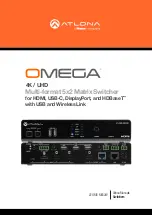
Using the Command-Line Interface
137
You can also initiate a Telnet session from the OpenManage Switch
Administrator. For more information, see "Initiating a Telnet Session from the
Web Interface" on page 288.
Understanding Command Modes
The CLI groups commands into modes according to the command function.
Each of the command modes supports specific software commands. The
commands in one mode are not available until you switch to that particular
mode, with the exception of the User EXEC mode commands. You can
execute the User EXEC mode commands in the Privileged EXEC mode.
To display the commands available in the current mode, enter a question
mark (?) at the command prompt. In each mode, a specific command is used
to navigate from one command mode to another.
The main command modes include the following:
• User EXEC — Commands in this mode permit connecting to remote
devices, changing terminal settings on a temporary basis, performing basic
tests, and listing system information.
• Privileged EXEC — Commands in this mode permit you to view all switch
settings and to enter the global configuration mode.
• Global Configuration — Commands in this mode manage the device
configuration on a global level and apply to system features, rather than to
a specific protocol or interface.
• Interface Configuration — Commands in this mode configure the settings
for a specific interface or range of interfaces.
• VLAN Configuration — Commands in this mode create and remove
VLANs and configure IGMP/MLD Snooping parameters for VLANs.
The CLI includes several additional command modes. For more information
about the CLI command modes, including details about all modes, see the
CLI Reference Guide
.
Table 5-1 describes how to navigate between CLI Command Mode and lists
the prompt that displays in each mode.
Summary of Contents for N2000 Series
Page 50: ...50 Contents ...
Page 54: ...54 Introduction ...
Page 134: ...134 Using Dell OpenManage Switch Administrator ...
Page 168: ...168 Setting Basic Network Information ...
Page 206: ...206 Managing a Switch Stack ...
Page 242: ...242 Configuring Authentication Authorization and Accounting ...
Page 318: ...318 Managing General System Settings Figure 12 24 Verify MOTD ...
Page 322: ...322 Managing General System Settings ...
Page 358: ...358 Configuring SNMP ...
Page 388: ...388 Managing Images and Files ...
Page 415: ...Monitoring Switch Traffic 415 Figure 16 2 sFlow Agent Summary ...
Page 451: ...Monitoring Switch Traffic 451 5 On the Capture Options dialog click Manage Interfaces ...
Page 458: ...458 Monitoring Switch Traffic ...
Page 488: ...488 Configuring Port Characteristics Figure 18 3 Copy Port Settings 8 Click Apply ...
Page 502: ...502 Configuring Port Characteristics ...
Page 567: ...Configuring Port and System Security 567 Figure 19 38 Captive Portal Client Status ...
Page 674: ...674 Configuring VLANs Figure 21 17 GVRP Port Parameters Table ...
Page 680: ...680 Configuring VLANs Figure 21 24 Double VLAN Port Parameter Table ...
Page 714: ...714 Configuring VLANs ...
Page 737: ...Configuring the Spanning Tree Protocol 737 Figure 22 9 Spanning Tree Global Settings ...
Page 760: ...760 Configuring the Spanning Tree Protocol ...
Page 786: ...786 Discovering Network Devices ...
Page 793: ...Configuring Port Based Traffic Control 793 Figure 24 3 Storm Control 5 Click Apply ...
Page 878: ...878 Configuring Connectivity Fault Management ...
Page 899: ...Snooping and Inspecting Traffic 899 Figure 27 17 DAI Interface Configuration Summary ...
Page 903: ...Snooping and Inspecting Traffic 903 Figure 27 24 Dynamic ARP Inspection Statistics ...
Page 924: ...924 Configuring Link Aggregation Figure 28 7 LAG Hash Summary ...
Page 982: ...982 Configuring Link Aggregation ...
Page 1062: ...1062 Configuring DHCP Server and Relay Settings ...
Page 1096: ...1096 Configuring L2 and L3 Relay Features Figure 34 3 DHCP Relay Interface Summary ...
Page 1200: ...1200 Configuring OSPF and OSPFv3 ...
Page 1216: ...1216 Configuring RIP ...
Page 1240: ...1240 Configuring VRRP ...
Page 1291: ...Configuring Differentiated Services 1291 Figure 40 5 DiffServ Class Criteria ...
Page 1336: ...1336 Configuring Auto VoIP ...
Page 1367: ...Managing IPv4 and IPv6 Multicast 1367 Figure 43 20 IGMP Cache Information ...
Page 1422: ...1422 Managing IPv4 and IPv6 Multicast ...
Page 1440: ...1440 System Process Definitions ...
Page 1460: ...Index 1460 ...
















































